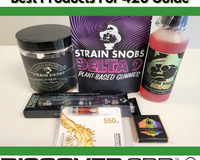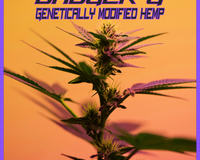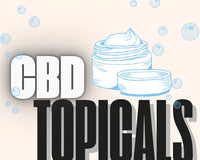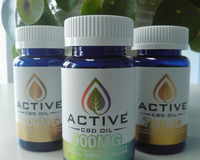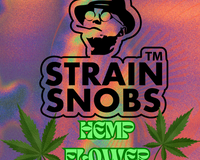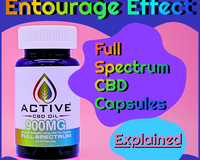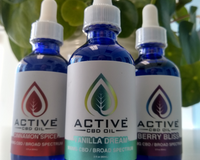With so many new and exciting advances being made in the cannabis community, there's a good chance you've heard of Delta 8 and Delta 9. But what exactly are they and how do they compare?
In this article, we will be discussing the primary differences and similarities between Delta-9 vs Delta-8 including how and why they work, where they come from, their effects, what they are primarily used for, and their safety.
Delta 9 THC vs Delta 8 THC
An overview
THC or Tetrahydrocannabinol is one of at least 113 cannabinoids found in the cannabis sativa plant. When you hear people talking about THC, they're typically talking about delta 9-THC. Delta 9 THC is what's known as a THC isomer. An isomer is when the same compound (in this case, THC) has a different formation of molecules.
In the case of delta-8 vs delta-9, for Delta 9 specifically, the double bond would be on the ninth carbon ring, hence its name. Delta 8 is also a THC isomer and its double bond is on the eighth carbon ring. This slight shift of a double bond causes similar yet very different effects on the endocannabinoid system or ECS.
Everybody has an endocannabinoid system. It's a biological system that helps the body regulate and balance many key bodily functions. It also plays an important role in the development of the central nervous system or CNS. Once THC interacts with the ECS it binds to the CB receptors causing the varying sensations associated with consuming marijuana.

Delta 9 THC Effects
Delta 9 THC is the most abundant cannabinoid currently known in the marijuana and hemp plants which also makes it the most well-studied! In fact, with delta-8 vs delta-9, delta-9 THC is a far more psychoactive isomer found within the marijuana plant.
Delta 9 is known to cause feelings of; euphoria, tiredness, altered perception of time, relaxation, heightened sensory reception, increased appetite, and in higher doses anxiety, paranoia, and disconnected thoughts. This is currently thought to be because of the increasingly high THC content in marijuana.
Have you ever been to a dispensary and seen, for example, 27% THC printed on the side of the label? This lets you know that 27% of the plant's dry weight is THC. However, these high percentages have only been seen in recent years due to new extraction and growth methods. In fact, in the 1920s the average dry-weight THC content was around 2%. But currently, the dry weight content is expected to be between 17 and 30%!
Generally speaking, the higher delta 9 THC content the plant has, the more psychoactive and intense the effects will be post-consumption. And because everybody's ECS is different, everyone will experience the effects of cannabis and its isomers in their own unique way.
Delta 9 History
However, Delta 9 is far more than a psychoactive compound. When it comes to delta-8 vs delta-9, delta-9 THC has been used for Melania and has a complicated history. In fact, it was included in Emperor Shen Nung's pharmacopeia in 2800 B.C. Stating Assyrians, Indian Hindus, Romans, and Greeks used the cannabis plant for medical use to treat an array of health problems!
Then, in BC, the Hindu God Shiva was given the title ‘The Lord of Bhang’ as the Cannabis plant was his favorite food. It was used as a religious rite claiming that when people became sick it was ‘the hot breath of the Gods’ who had been angered by the individual, therefore, making them sick. But the use of cannabis alleviated this anger, therefore, alleviating their symptoms.
In 1841, William Brooke O’Shaughnessy brought Cannabis into Western Culture after visiting India- he would go on to write about the many therapeutic uses of cannabis. From here, the modern-day cannabis industry would begin to develop and cannabis research would hit an all-time high.
Today, it’s commonly used to help individuals manage symptoms of various conditions! Medical cannabis has been known to provide medical benefits in conditions such as; depression, anxiety, migraines, IBS, inflammation, glaucoma, nausea, muscle spasticity, MS, pain management, HIV/AIDS, radiation from chemotherapies, as well as seizures.

Delta 9 vs Delta 8
How and why does delta 8 work?
Delta 8 THC, also known as ‘diet-weed’, is another THC isomer naturally found in the cannabis plant. Given its name for the double bond on its eighth carbon ring. Delta 8 THC is significantly less potent than its counterpart. In fact, delta 8 THC is estimated to be only about two-thirds as psychoactive as delta 9 THC.
Total synthesis of Delta 8 THC was achieved in 1965 and it’s typically synthesized from cannabidiol (CBD) extracted from hemp. Delta 8 THC also binds differently to your CB1 and CB2 receptors.
Our CB1 receptors are responsible for signaling both our brain cells and nervous system. While CB2 receptors are responsible for signaling our body and immune system.
Because Delta 8 THC has a smaller molecular structure, delta 8 also has a much easier time passing through the blood-brain barrier and connecting to the CB receptors.
Delta 8 THC also binds to the cannabinoid receptors in the brain. Specifically in the Basal Ganglia (motor control, behavior, and emotion) Cerebral Cortex (language, memory, learning, personality), and Cerebellum (coordination and movement).
However, it binds to these receptors far less efficiently than its counterpart Delta 9 causing the 'diet-weed' like effects.
Delta 8 THC effects
A very popular question is what does Delta 8-THC feel like? In 2021 a study was conducted using 521 Delta-8 THC users that were asked to comprise a list of self-reported effects from using Delta 8 THC.
Survey participants reported effects included; 74% feeling an altered sense of time, 55% feeling pain relief, 71% feeling relaxation, 68% feeling euphoria, 81% reported difficulty concentrating, and 80% reported having short-term memory complications.
Many people generally report similar feelings as compared to Delta 9 THC but also report the effects are far milder and said to be easier to handle.
These similar effects include dry mouth, increased heart rate, munchies, fatigue, redness in the eyes, impaired motor skills, and increased blood pressure. For this reason, in the argument of delta 9 vs delta 8, delta-8 is an incredibly popular choice for individuals looking to ween off of traditional Delta-9 THC or to experience the health benefits of THC without having an overwhelming experience.

Delta 8 THC vs Delta 9
Legality and Saftey
When it comes to the argument of delta 8 THC vs delta 9 THC, safety is a big talking point. In the 2018 Farm Bill, hemp-derived CBD and other hemp-derived cannabinoids were made federally legal as long as they contained no more than .3% THC by volume. Due to the farm bill, a legal loophole of sorts was created making all THC cannabinoids technically legal.
Any cannabis containing under .3% THC and hemp-derived was removed from the controlled substance list. Because Delta 8 THC is partially synthesized from hemp plants it also falls under this category.
It's also important to note that both delta 8 THC and delta 9 THC will register positive on drug tests as delta 8 THC still contains trace amounts of THC.
As far as public health and safety are concerned, in a study conducted in 1973, researchers gave both dogs and monkeys 9000 kg/mg of Delta 8 THC and found it to be non-lethal.
However, in 2021 the FDA issued a consumer update warning regarding Delta 8 THC. They saw a large number of individuals experiencing vomiting, hallucinations, and even passing out. They warned this may be due to the presence of contaminants such as pesticides and heavy metals as well as potentially harmful chemicals.
When it comes to the argument of delta-9 vs delta-8, Delta-8 THC is not federally regulated where as Delta-9 THC is. So it's easy for illegitimate companies to sell sketchy products that pose safety concerns.
This is why it’s so important to make sure you're purchasing these products through a reputable company such as Discover CBD.
A few ways you can insure you're getting safe cannabis products is to look for companies that provide third-party lab testing of all their products. This will ensure you have a complete profile available of everything contained within the product. It's also a great idea to look into the history of the company you are purchasing through.
If Delta 8 is incorrectly produced it can cause adverse effects and reactions so it’s important to make sure it’s from a trusted source.
In fact, Discover CBD has the largest iso-clean room in the country making their products both high quality and contaminate-free!

Delta-9 vs Delta 8
Both Delta-8 and Delta-9 products are available in a variety of different forms with various methods of consumption to choose from!
These methods include; vaporization/smoking, sublingual application, topicals, transdermals, and edibles/ capsules.
Vaporization/ Smoking
Vaporization tends to be the most popular method when it comes to Delta-9 THC specifically. Vaporization and smoking are when you heat the product, in this case, Delta-8 THC and Delta-9 THC enough so that it produces smoke. You inhale this smoke which is absorbed into the body through your lungs thus producing its effects.
You’ll commonly see people using this method with products such as dabs (flower extract), flower, rosin, and sometimes even isolate powders. The onset of effects for this method is usually seen almost instantly and typically last for three to four hours.
This is a popular method of consumption for those looking to manage symptoms associated with anxiety, panic attacks, migraines, and daily stresses.
Edibles/ Capsules
Edibles are also an extremely common method people use to consume and feel the effects of Delta-8 and Delta-9 THC. An edible is fairly self-explanatory. They’re typically seen as baked goods, drinks, snacks, or candy; but also occasionally are seen in capsule form, live-rosins, and activated isolate powders or crystals (which can be mixed into drinks or sprinkled onto snacks).
These food-based items are infused with Delta-9 THC and Delta-8 THC so that once they’re eaten they make their way through the digestive tract where they begin to break down and absorb into the body.
Because of the time these take to make their way through the digestive tract, the onset is usually seen anywhere from 45 minutes to an hour with effects lasting anywhere from 8 to 10 hours.
This method is extremely popular due to the fact that it’s fairly discreet, lasts a long period of time, and is seen for managing symptoms of pain, sleep difficulties, stress, etc. Capsules and edibles are also an incredibly popular option for those with tremors who have a difficult time doing their Delta-9 vs Delta 8 THC.
Sublingual Application
Sublingual application is typically used in conjunction with Delta-9 vs Delta 8 THC tinctures. This is when you take a dose of tincture and place it under the tongue for 60-90 seconds.
Because there’s a large concentration of blood vessels underneath the tongue the product absorbs fast and the effects are felt in a relatively short period of time. Onset for sublingual application usually takes between 15 and 20 minutes and lasts for 4 to 6 hours.
This is a popular choice for the daily user looking to manage system-wide symptoms without the hassle or smell associated with smoking. It's also convenient as users don't have to re-dose their delta-8 THC or delta-9 THC often.
Topicals
Topical application is typically used for individuals struggling with localized pain relief management. It's applied directly to the skin and potential benefits are felt within 5-15 minutes and lasting two to four hours. These cannabis products can be seen as lotions, salves, and roll-ons.
Topicals are not as common with delta-9 and delta-8 products but that doesn't mean they don't exist! Strain Snobs, for example, has a Delta-8 Salve that's been known to help its customers with muscle aches and pains. Because topicals are applied to the skin and do not absorb into the bloodstream, no psychoactive effects will be felt.
Transdermals
Transdermals, on the other hand, do absorb into the bloodstream and are effective system-wide. These patches have a predetermined dose of either Delta-9 or Delta-8 THC that's applied directly to the skin. Over time the dose is slowly released into the bloodstream providing consistent relief throughout the day that's both discreet and effective!
These patches typically last anywhere from 4 to 6 hours and can be applied anywhere on the body, though it's suggested to apply the patch to veinous areas such as the wrist. They can also be cut into smaller pieces or doses to be applied to multiple areas! Delta 8 THC vs Delta 9 THC transdermal patches are frequently reported to be an effective way to manage symptoms of conditions such as; chronic pain, muscle spasticity, fibromyalgia, nausea, loss of appetite, and many more.
As far as methods of application go in delta-9 vs delta 8 THC, both cannabinoids are available in the same variety of products leaving virtually no difference! (Aside from the intensity of effects).

Delta 8 vs Delta 9
Conclusion
Delta 8 vs delta-9 can be a complicated question to answer as there's so much to consider. The answer truly depends on the user's specific needs and wants from the product they're consuming. Delta 8 vs delta-9 has many key differences such as effects, use throughout history, and safety.
Delta-8 THC vs delta-9 THC also has many key similarities! Such as where they come from and how to use them. When it comes to delta 8 THC vs delta 9, both can be dangerous if derived from untrustworthy sources. Though many cannabis consumers tend to shy away from delta-8 THC products as more research is needed to determine whether or not Delta 8 is totally safe. Always be sure to research and vet the sources you're purchasing your products through and to speak with your healthcare provider if you're considering trying either.
The primary difference between these cannabinoids is that delta 8 THC is known to be less psychoactive making it popular for users looking to receive more traditionally medicinal benefits of THC or to ween off of Delta 9 THC. It's important to ensure Delta 8 THC and Delta 9 THC products are from a source that's both knowledgeable and trustworthy such as DiscoverCBD!

